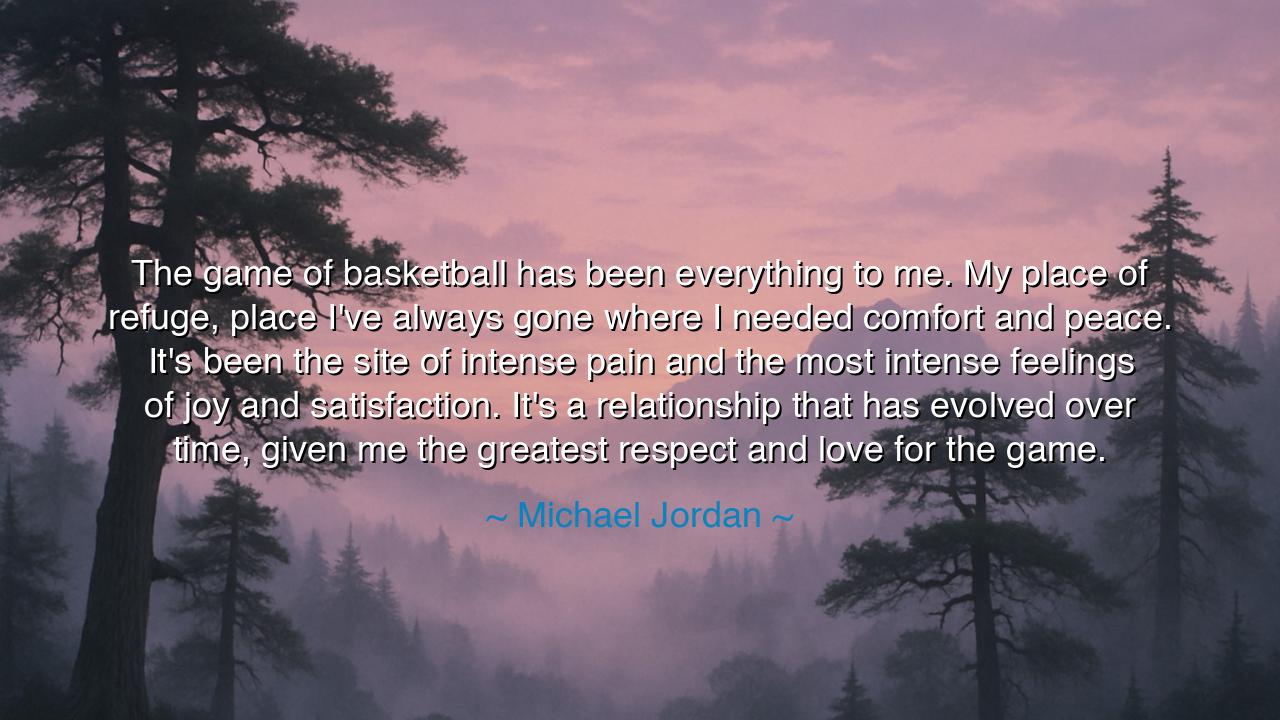
The game of basketball has been everything to me. My place of
The game of basketball has been everything to me. My place of refuge, place I've always gone where I needed comfort and peace. It's been the site of intense pain and the most intense feelings of joy and satisfaction. It's a relationship that has evolved over time, given me the greatest respect and love for the game.






In the voice of reverence and remembrance, Michael Jordan, the greatest among those who have graced the courts of the earth, once said: “The game of basketball has been everything to me. My place of refuge, place I've always gone where I needed comfort and peace. It's been the site of intense pain and the most intense feelings of joy and satisfaction. It's a relationship that has evolved over time, given me the greatest respect and love for the game.” In these words, spoken with humility and fire, lies a truth known to all who have devoted themselves to a calling greater than comfort — that greatness is not a possession, but a relationship forged through love, pain, and unwavering devotion.
The origin of this reflection springs from Jordan’s lifelong journey — from a boy who was once cut from his high school basketball team, to a man who conquered the world through will, discipline, and artistry. To him, the game of basketball was not merely a sport, but a sacred arena where he met himself — his strengths, his weaknesses, his doubts, and his destiny. It was his place of refuge, a sanctuary where he could silence the chaos of life and commune with something pure. For him, as for the ancients who sought wisdom in solitude, the court was both temple and battlefield — a place where struggle became transformation, and the pursuit of excellence became a form of worship.
When Jordan speaks of comfort and peace, we hear the cry of every soul that has found salvation in devotion. There are those who turn to art, to prayer, to nature — Jordan turned to the game. In the rhythm of the ball against the floor, in the echo of sneakers on hardwood, he found stillness. The court became his meditation, his altar of self-discovery. Yet he does not deny the pain that came with it — the losses, the exhaustion, the sacrifices unseen by the world. For as every wise one knows, the path of mastery demands both joy and suffering. The same place that brings peace must also demand sacrifice.
In this way, Jordan’s relationship with basketball mirrors the sacred relationships of old — the bond between the artist and his craft, the warrior and his sword, the sailor and the sea. Each knows both the beauty and the danger of what they love. Consider the story of Leonardo da Vinci, whose endless quest to perfect his art brought him both ecstasy and torment. Or think of Beethoven, who continued to compose when silence swallowed his hearing. Like them, Jordan’s love was complete because it included both triumph and struggle. He did not flee from pain — he embraced it as the necessary twin of greatness.
When he says that his relationship with basketball has evolved over time, we see the wisdom of maturity — that love, like all living things, must grow or perish. The young Jordan played for glory, for competition, for the thrill of victory. But as he aged, that fire deepened into reverence. He began to understand that greatness was not in dominance alone, but in respect — respect for the game, for his opponents, for the journey itself. This is the evolution of all true devotion: to begin with desire and end in gratitude. The master learns that the craft he once sought to conquer has, in truth, been shaping him all along.
There is in this quote a universal lesson that transcends sport. Each of us has our own “court,” our own place of refuge — the work, the passion, the calling that steadies the soul when the world grows uncertain. And like Jordan, we will find that it will bring both pain and joy, both defeat and triumph. What matters is not the absence of struggle, but the constancy of love — the willingness to return, again and again, even when it hurts, even when it seems impossible. For the soul that loves its work deeply enough will never truly fail; every wound will become wisdom, every challenge a deeper bond with the thing it cherishes.
So, my dear listener, take Jordan’s words not as the reflection of a champion only, but as the counsel of a sage. Find that which stirs your spirit, and devote yourself wholly to it. Let it be your refuge in chaos, your teacher in humility, your source of peace and transformation. Know that the path will not be easy — but in your pain, you will find meaning, and in your discipline, you will discover grace. As Jordan’s life teaches us, love for one’s calling is not a momentary spark, but a lifelong flame — one that must be tended through perseverance, gratitude, and respect.
For in the end, as Michael Jordan reveals, greatness is not born from talent alone, but from relationship — the sacred bond between a soul and its purpose. To love what you do so completely that it gives you both comfort and pain, humility and power, is to live fully. And when that love becomes your refuge, your teacher, and your home, you, too, will have found your own court — the place where your spirit, like Jordan’s, can rise, fall, and rise again, forever blooming in the eternal game of life.






AAdministratorAdministrator
Welcome, honored guests. Please leave a comment, we will respond soon